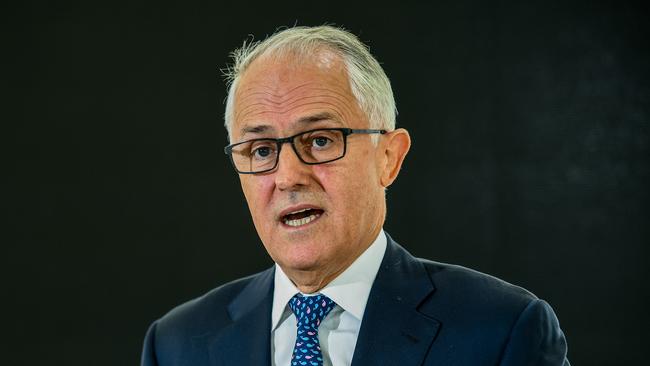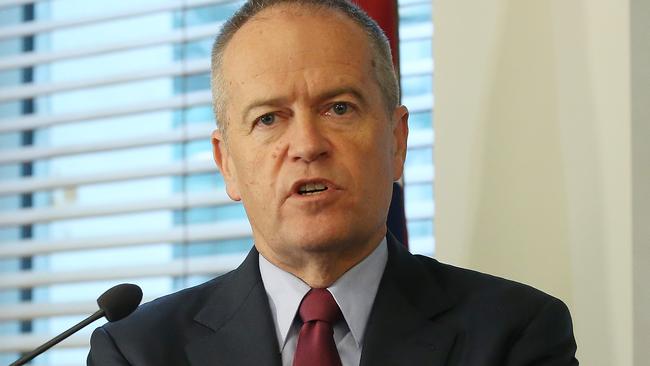Bill Shorten has warning for government over citizenship attacks
Some government MPs could be hit by the ‘constitutional bus’ if they keep raising citizenship queries, Labor leader warns.

Bill Shorten has cautioned the government over any attacks against the citizenship status of Labor MPs like Anne Aly, warning it could trigger reprisals against the eligibility of Liberal MPs including Sydney based MP Jason Falinski.
The Opposition Leader today defended Dr Aly — who holds the marginal West Australian seat of Cowan — amid questions from legal experts about whether an unsigned document from the Egyptian embassy proved beyond doubt that she was no longer a dual citizen.
“The highest representative of the Egyptian government in Australia has said she’s not (a dual citizen),” he said. “Now if the government’s not satisfied with that then they are throwing some of their own members under the proverbial constitutional bus aren’t they? Julia Banks, Jason Falinski — admittedly not household names but, nonetheless, Liberal backbenchers”.
“They are relying on the same standard of proof that Anne Aly is and if they say that’s not satisfactory then I think their own members of parliament have some explaining to do”.
Mr Shorten lashed out at the propagation of a “birther theory” in Australia’s political debate and accused Malcolm Turnbull of dismissing the findings of a committee report proposing a referendum to solve the dilemmas posed by section 44 of the constitution which prohibits dual nationals from entering parliament.
“I think it is important that we don’t simply dismiss this unanimous report chaired by Linda Reynolds — a West Australian Liberal Senator — and just simply swipe it off and ignore it like Mr Turnbull’s just done,” the Opposition Leader said.
“I’m prepared to sit down and talk with the Liberals to see how we can improve the processes because section 44 has proved to be very complex and I think that a lot of Australians are frustrated by the outcomes”.
“I just ask Mr Turnbull — please don’t brush aside the recommendations of senior respected women backbenchers of your own party so casually.”

‘Get your act together’
Malcolm Turnbull has strengthened his opposition to a referendum to overhaul the constitutional bar on dual citizens in parliament, arguing that it would not be supported by the Australian people.
The Prime Minister made the comments following the release of a report by the Joint Standing Committee on Electoral Matters which today recommended a referendum to repeal or modify section 44 of the constitution which bans dual nationals from entering parliament.
“I have to say to you as someone who is not without experience in attempting to change the constitution, that I very much doubt whether Australians would support a change to the constitution to allow people with dual nationalities to sit in the parliament,” Mr Turnbull said.
“What we have to do is focus on the constitution as it is written. That’s the law of the land as it is interpreted by the High Court and we have to make sure that everybody complies with it,” Mr Turnbull said.
The government is likely to adopt a series of other proposals canvassed in the committee’s report to tighten the testing around candidates in a bid to weed out those who are ineligible under section 44 of the constitution — a process which may delay the date of the “Super Saturday” by-elections until July.
The Australian understands the government is considering a range of measures including a requirement for all candidates to make a public disclosure of their family citizenship history when they nominate as well as any other information that may contravene section 44 including details of any bankruptcy, criminal convictions and Commonwealth contracts.
The government is also understood to be considering ways to provide greater stability during future parliaments, allowing a window period of 40 days during which an election result can be challenged and an individual’s eligibility tested under section 44.
This challenge to an election result would need to be informed by the documents produced by a candidate prior to the close of nominations. The committee report proposes that breaches to section 44 which are not discovered in the 40 day window period — or which arise after this point — be referred to the Privileges Committee.
Mr Turnbull indicated the government would be pressing ahead with changes and took a swipe at the four Labor MPs who had been disqualified or resigned from parliament because of a breach under section 44 including former Senator Katy Gallagher, WA MP Josh Wilson, Tasmanian MP Justine Keay and Queensland MP Susan Lamb.
“There’ll be changes made to ensure that people make greater disclosure on these citizenship matters at the time they nominate for parliament,” Mr Turnbull said. “They all knew they were citizens of the UK when they nominated”.
“There is no problem with renouncing your British citizenship as Susan Lamb has belatedly discovered. Right. This is a citizenship that a while ago she said she didn’t have. So, what people have to do is simply get their act together, get their paperwork done in time before they nominate”.
“It’s very straight forward. Australians expect politicians to set a high standard”.
PM urged to hold referendum
The Joint Standing Committee on Electoral Matters — chaired by West Australian Liberal Senator Linda Reynolds — has this morning released its report with the first recommendation proposing a change to the constitution.
The report says: “The Committee recommends that the Australian Government prepare a proposed referendum question to either: repeal sections 44 and 45 of the Constitution; or insert into sections 44 and 45 the words: ‘Until the Parliament otherwise provides ...’”.
The committee says that, if the referendum passes, the government should engage with the community to “determine contemporary expectations of standards in order to address all matters of qualification and disqualification for Parliament”.
It suggests that the result of this engagement could see legislation introduced into parliament under section 34 of the Constitution to address the qualifications of MPs to uphold community expectations.
The report says that, if the referendum does not proceed or pass, the government should consider strategies to “mitigate the impact of section 44”.
It proposes a number of strategies including support for the Australian Electoral Commission to develop “online self assessment tools” for candidates; additional education on the requirements of section 44 to independents and minor parties as well as the introduction of a compulsory “preliminary step” to help gather legal advice before a referral is made by the parliament to the High Court on disqualification issues.
The committee also suggests the possibility of working with foreign governments to expedite or develop processes for “automatic citizenship renunciation” and to ensure that invalid candidates cannot manipulate election outcomes.
Special Minister of State Mathias Cormann welcomed the report, in particular its “recommendations on how to improve nomination arrangements for candidates,” but made clear the government had no intention of changing the constitution.
“While the Government is not inclined to pursue a referendum to change section 44 of the Constitution at this time, we will give due consideration to the findings and recommendations of the committee,” Senator Cormann said.
“As the committee itself recognised, successful constitutional change is challenging and making the case would take more time than is available prior to the next general election”.
However, Senator Cormann said the government was taking “active steps” to ensure the citizenship crisis was properly addressed and that “improved processes” were implemented ahead of the upcoming “Super Saturday” of five by-elections.
“We intend to move now to improve the existing candidate nomination process for elections in accordance with the relevant unanimous JSCEM recommendations on these matters,” he said.
“We will consult swiftly with relevant stakeholders on proposed changes to give effect to the JSCEM recommendations on improvements to the nomination arrangements to ensure these improved processes will be in place for the upcoming by-elections”.
Senator Cormann said that, under these changes, candidates would provide information upon nomination to the AEC “consistent with the information that was recently requested from all current Members and Senators for inclusion on the citizenship register — as well as information on other potential disqualifications under section 44”.
“The government is committed to ensuring the constitutional legitimacy of the Australian parliament”.
Senator Reynolds said the report found that section 44 was becoming “increasingly undemocratic” and that future referrals to the High Court “would be inevitable”.
“Problems with section 44 are neither new, nor unforeseen,” Senator Reynolds said. “Twenty years of Parliamentary Committee reports and a Constitutional Convention have all predicted
that without constitutional reform to parts or all of section 44, challenges would occur to otherwise qualified and validly elected Members of Parliament”.
Senator Reynolds said that, in addition to previously identified problems with section 44, recent High Court decisions had created new uncertainties and opportunities to manipulate election results.
“Recent High Court decisions on the interpretation on s. 44 are clear to nominate as a candidate, all reasonable steps must be taken prior to nomination to ensure all candidates are not disqualified to be on the ballot paper,” she said.
The committee’s report notes that the preconditions for a successful referendum “will take time” and argues it will not be possible before the next election.
The Australian understands that the measures the government is considering implementing before the next round of by-elections include:
A requirement for all candidates to make a public disclosure of family citizenship history at the time of nomination; a requirement for all candidates to disclose any information relevant to other parts of section 44 including details on bankruptcy, criminal convictions and contracts with the Commonwealth; a requirement for the parliament to agree in advance what action it will take in relation to alleged breaches of section 44 through amendments to the standing orders; an option for the parliament to allow a person to challenge the election result if there is a breach of section 44 arising from publicly disclosed information via a petition filed within 40 days of the return of the writ — (This is suggested as the only way for an individual’s eligibility to be challenged, with the matter unable to be raised again during the life of the parliament); an option for a breach to be referred to the Privileges Committee if it arises from information that was not publicly disclosed or which occurred after the candidate nominated.







